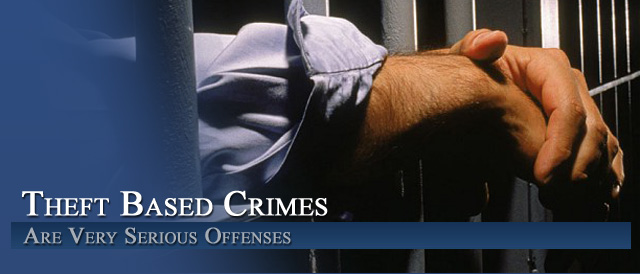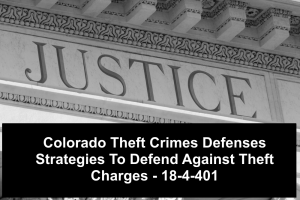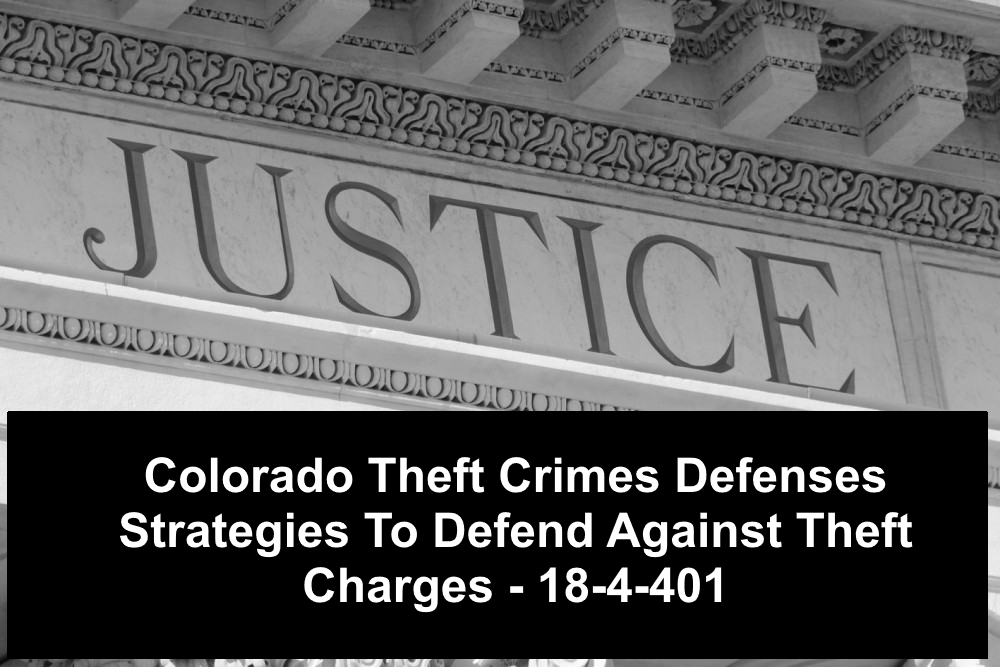




Colorado Theft Crimes Defenses – Strategies To Defend Against Theft Charges – 18-4-401
By H. Michael Steinberg Colorado Theft Crimes Criminal Defense Lawyer – Attorney
 Colorado Theft Crimes Defenses – Strategies To Defend Against Theft Charges – 18-4-401 – The crimes of Theft carry the kind of severe consequences, whether the conviction is for a misdemeanor or felony, that can destroy a career because of an individual’s ignorance of the unforeseen consequences of such a conviction. While any criminal conviction may impact an individual’s future – theft crimes have a particularly harsh impact on a person’s life plan to include, employment, housing, starting a business, professional licensing, college, or graduate schools.
Colorado Theft Crimes Defenses – Strategies To Defend Against Theft Charges – 18-4-401 – The crimes of Theft carry the kind of severe consequences, whether the conviction is for a misdemeanor or felony, that can destroy a career because of an individual’s ignorance of the unforeseen consequences of such a conviction. While any criminal conviction may impact an individual’s future – theft crimes have a particularly harsh impact on a person’s life plan to include, employment, housing, starting a business, professional licensing, college, or graduate schools.
Colorado theft crimes are often referred to as “crimes of moral turpitude” they stigmatize you, and unlike many other kinds of convictions, such as illegally possessing marijuana for example, reflect negatively on your individual character. Theft is viewed by many as a far more serious crime than other crimes whether they are classified at the same level of possible punishment.
Pleading guilty to a theft crime, even a minor theft crime such as shoplifting, should be considered very carefully because of the ramifications and collateral impacts of this kind of conviction on an individual’s criminal record years after the conviction enters.
Defending Against Colorado Theft Crime Charges – Understanding The Elements Of Colorado Theft Charges – 18-4-401
The Definition of Theft
“Theft” — sometimes called “larceny” is a broad term that covers a wide variety of criminal offenses.
The most basic elements of the Colorado Crime of Theft (intent to permanently deprive) are:
1. That a Defendant,
2. in the State of Colorado, at or about the date and place charged,
3. knowingly,
4. obtained, retained, or exercised control over anything of value of another,
5. without authorization or by threat or deception, and
6. intended to deprive the other person permanently of the use or benefit of the thing of value.
The Breadth of Colorado Crimes Of Theft – A Law That Consolidates Various Methods Of Committing Theft In Colorado.
The crime of theft in Colorado can be committed in so many diverse and complex ways that the Colorado State Legislature enacted the following law to make that concern clear:
Colorado Revised Statutes Title 18 Criminal Code § 18-4-403 Statutory Intent
If any law of this state refers to or mentions larceny, stealing, embezzlement (except embezzlement of public moneys), false pretenses, confidence games, or shoplifting, that law shall be interpreted as if the word “theft” were substituted therefor; and in the enactment of sections 18-4-401 to 18-4-403 it is the intent of the general assembly to define one crime of theft and to incorporate therein such crimes, thereby removing distinctions and technicalities which previously existed in the pleading and proof of such crimes.
The Colorado Crimes Of Theft Are Very Diverse And Are Very Broadly Defined In 18-4-401
The specific law defining theft in Colorado contains several subsections that provide different grounds that essentially amount to different ways to commit A crime of theft.
Here is the law:
The Colorado Statute Defining The Crimes Of Theft – 18-4-401
(1) A person commits theft when he or she knowingly obtains, retains, or exercises control over anything of value of another without authorization or by threat or deception; or receives, loans money by pawn or pledge on, or disposes of anything of value or belonging to another that he or she knows or believes to have been stolen, and:
(a) Intends to deprive the other person permanently of the use or benefit of the thing of value;
(b) Knowingly uses, conceals, or abandons the thing of value in such manner as to deprive the other person permanently of its use or benefit;
(c) Uses, conceals, or abandons the thing of value intending that such use, concealment, or abandonment will deprive the other person permanently of its use or benefit;
(d) Demands any consideration to which he or she is not legally entitled as a condition of restoring the thing of value to the other person; or
(e) Knowingly retains the thing of value more than seventy-two hours after the agreed-upon time of return in any lease or hire agreement.
(1.5) For the purposes of this section, a thing of value is that of “another” if anyone other than the defendant has a possessory or proprietary interest therein.
Theft can occur in many contexts. There is the crime of theft of services such as home utilities, a hotel room, or even the illegal use of another’s identity taken for the purpose of steal property, (identity theft). Theft can also involve the commission of more complex crimes such as fraud or embezzlement (embezzlement is when a person, placed in a position of trust to manage the money or property of another person, appropriates that money or property for personal use).
Theft can also be as simple as shoplifting or a combination of the two crimes – a shoplifting involving embezzlement such as when a cashier fails to ring up a sale for a family member and the two pocket the proceeds.
Theft can take the form of insurance fraud such as turning in an insurance claim for a faked burglary or a in claim for a car that was never stolen – but where the owner crashed the car – and is now claiming it was done byin an accident by the owner.
One commits theft if one steals jewelry from a family member and then selling the stolen property at a pawnshop to pay bills or for illegal drugs or failing to return a rental car when the rental contract requires that it be returned on a certain date.
The Colorado Penalties for Theft
In Colorado theft can be charged as either a felony or a misdemeanor. What distinguishes the seriousness of the crime of theft charged is the value of the stolen property.
If the value involved in the Theft is less than $50: – it is a Petty Offense – (up to 6 months in jail and up to a $500.00 fine)
If the value involved in the Theft is between $50 and $300: it is a Class 3 Misdemeanor (up to 6 months in jail and up to $750.00 in fines).
If the value involved in the Theft is between $300 and $750: it is a Class 2 Misdemeanor (up to 1 year in jail and up to $1,000.00 in fines).
If the value involved in the Theft is between $750 and $2000: it is a Class 1 Misdemeanor (up to 1.5 years in jail and up to $5,000.00 in fines).
If the value involved in the Theft is between $2000 and $5000: it is a Class 6 Felony (up to 1.5 years in prison and up to $100,000 in fines).
If the value involved in the Theft is between $2000 and $20,000: it is a Class 5 Felony (up to 3 years in prison and up to $100,000.00 in fines).
If the value involved in the Theft is between $20,000 and $100,000: it is a Class 4 Felony (up to 6 years in prison and up to $500,000.00 in fines).
If the value involved in the Theft is between $100,000 and $1,000,000: it is a Class 3 Felony (up to 12 years in prison and up to $750,000.00 in fines).
If the value involved in the Theft is more than $1,000,000: it is a Class 2 Felony (up to 24 years in prison and up to $1 million in fines).
Enhancement For Prior Convictions Of Theft Crimes
It is important to note here that if a person is convicted of felony level theft involving merchandise taken from a store, and has “priors” which include at least two felony theft convictions from a store within the last four years, that person must be sentenced to at least the minimum term allowed for the offense and is not be eligible for probation or a suspended sentence under Colo. Rev. Stat. § 18-4-413.
Distinguishing The Colorado Crime Of Theft From The Colorado Crime Of Robbery
While the Colorado crime of Robbery, like theft, involves the taking money or property without permission, Robbery is much more serious because it involves the use of force or the threatened use of force.
The elements of the Colorado Crime of Robbery are:
1. That a Defendant,
2. in the State of Colorado, at or about the date and place charged,
3. knowingly,
4. took anything of value,
5. from the person or presence of another,
6. by the use of force, threats, or intimidation.
Unlike Theft, the alleged victim of a Robbery must be present when the illegal taking of property occurs. During a Robbery, the property is taken directly from the person.
Robbery in Colorado is always charged as a felony and the penalties for Robbery are among the must punitive in the Colorado criminal justice system.
The reason the crimes of Theft and Robbery are easily confused is because both involve taking someone else’s money or property. Robbery involves the use of force or intimidation to take property from another person. It is that use of force that makes Robbery, a much more serious crime.
Robbery is essentially a theft with two aggravating factors: a taking
(1) from victim’s person or immediate presence, and
(2) which is accomplished by the use of force or fear.
Defending Against Colorado Theft Crime Charges – The Initial Steps To Preparing The Defense Case
The first question a criminal defense lawyer must ask – and much of the information to answer this question will come directly from their client – what is the “sufficiency of the evidence?”
Can it be determined whether the Government has sufficient evidence to prove each one of the “elements” of the theft crime charged?
Can they prove identity – that the accused is the person who committed the crime?
If so, then can they prove the value of the items allegedly stolen?
Are there other defenses to assert if both of the above elements can be proven?
To obtain answers to these questions, your Colorado criminal defense lawyer will need to do the following things – mostly in the following order:
1. Conduct the client interview;
2. Obtain the police reports and any notes that are available;
3. Identify the witnesses and the physical evidence in the case;
4. If necessary – re-interview those witnesses and examine the evidence;
5. Obtain any and all video if it exists – to include surveillance and body or auto cam video
Defending Against Colorado Theft Crime Charges – Colorado Defenses To Crimes Involving Theft
The following descriptions of possible defenses to the crime of Theft in Colorado do not comprise an exhaustive list. Rather, the descriptions are more of a group of ideas to help with developing a theory of defense. A defense theory is fundamental to presenting a coherent theory to a judge or to a jury at trial – or to a prosecutor for the purposes of a fair and just plea bargain.
The Burden Of Proof Defense – (aka The “General Denial” Defense)
The foundation of all defense theories is the criminal defense lawyer’s duty to hold the prosecutor to their burden of proof – proof beyond a reasonable doubt. A general denial defense means that the Defendant intends to hold the prosecutor to that very high “burden of proof.”
All Colorado theft crimes are broken into the elements (see above). Attacks on the burden of proof include an attack on every element where there may be a weakness in the case – as outline below.
Is This Really A Theft Or Is It A Form Of “Stressed Relationship” Theft?
Relationship defenses stress the “give and take” nature of such relationship situations as roommates, boyfriend – girlfriend, parent – child, and formerly married couples. A claim that property has been stolen in a relationship case is subject to a defense attack based upon the free exchange between once close or loving people raises issues that go to the core of the credibility of the person making the claim of being a victim of theft.
Was this a gift? Was this a situation where permission had been given to the alleged thief to have or at least temporarily use the property? The hallmark of this defense is the fact that the relationship in question eventually goes sour, and then, and only then, the gift suddenly “becomes” a theft.
Was There A “Mistake of Fact?”
This defense is asserted based on the “state of mind” of the alleged thief. This defense for example may ask whether, when a Defendant takes the property at issue, he or she believes it belongs to one person (who has given permission for the transfer), when, in fact, the property actually belongs to a different person.
In this situation, the alleged thief may actually be the victim of another’s fraudulent act or even another’s “mistake of fact.”
Mistake of fact defenses may apply in shoplifting cases where a person may believe they have paid for an item or mistakenly places an item in his or her pocket at a moment of distraction.
Was This A Gift Outside Of A Relationship? (Defense)
In addition to the relationship defense (above), one often sees asserted the “gift” defense applied, for example, to a theft from an at risk victim (e.g. an elderly theft) case. Theft from the elderly involves the Defendant illegally taking the assets of a vulnerable person. The gift defense asserts that the property at issue was given as a gift and the giving of the gift fits a pattern of giving by the alleged “victim” based on prior facts and evidence.
Theft from the elderly can take the form of crimes involving fraud, embezzlement or forgery. It often is alleged in the context of caregivers allegedly taking property from the persons they are charged with protecting. Many times an alleged theft from an at risk person may have been the result of an honest misunderstanding of ownership or it may be based on miscommunication. These cases are fact specific and defense theories often turn on the nature of the relationship at issue.
Ownership – Understanding The Right To Bring Theft Charges – Who Actually Owns The Property?
One key area of attacking a prosecutor’s case is challenging the assumption that the alleged victim actually owned the property at issue. If the Defense can establish reasonable doubt as the ownership of the item in question, a critical element of the State’s case, a jury could be persuaded to acquit on that basis alone.
Was The Accused Too Intoxicated To Know He or She Was Committing A Crime? The Intoxication Defense?
Because theft crimes require the specific intent to steal, it may be possible to establish that the accused was too intoxicated at the time the alleged theft occurred, to realize that person was stealing something. Intoxication defenses can run the gamut of prior consumption of any one or multiple substances to include alcohol, prescriptions, chemicals – even illegal drugs.
If a Defendant is unable to form the requisite “intent to steal” (mens rea) an affirmative defense to the crime of theft may be perfected.
Is There A Defense Based On Entrapment?
Asserting the Colorado defense of entrapment is difficult. For this defense to succeed the Defense must prove that the Defendant was induced to commit a crime – was actually lured into committing the theft by a government agent – with the goal of apprehending and prosecuting the targeted individual – the Defendant.
Was There The Specific Intent To Commit A Theft? (The Mens Rea – or Mental State Element Defense)
Following under the rubric of intoxication as a defense, it can be asserted – generally – that because theft is a “specific intent crime,” the act of taking was an accident. Theft can not be committed by accident.
A closer look at how crimes are allegedly committed is important at this point. Crimes are broken into two basic categories. The mens rea is the mental state necessary to commit a crime. The actus reus is the actual act – the performance – of the crime. If a Defendant never intended to commit a crime – that is, there was never the required purpose or intent to commit the elements that constitute the crime – for example the intent to deprive the owner of his/her property permanently, as opposed to just borrowing the property, the State should not be able to persuade the jury to convict on the crime of theft.
While returning stolen property is not a defense, it could establish that a Defendant always had the intent to return the property – meaning only there was only an intent to borrow the property at issue.
Example 1: Theft by Possessing Stolen Property – Possession – If one doesn’t know the property at issue was stolen, one cannot be convicted of theft by possession of stolen property.
Example 2: Aggravated Motor Vehicle (Auto) Theft – Borrowing an ex-girlfriend’s car (as has been the case many times before) is not aggravated motor vehicle theft. (It may be joyriding – however).
In a shoplifting case – forgetting to pay for an item at the bottom of your cart – hidden from view, does not equal the intent to steal.
What Was the Actual Value Of The Alleged Stolen Item? (Value Defense)
While sometimes not a “complete defense” – criminal defense lawyers will often attack the State’s case based on the alleged value of the property at issue. The value of the alleged property in a theft case sets the level of crime that is charged (see above). If the value of the item or property does not rise to the level of the original charge, – a value defense is a very fact specific defense, a jury should not convict of the higher crime but can sometimes be persuaded to acquit on the higher charge and convict only a lower the charge….for example – taking a felony down to a misdemeanor.
The Use Of An Expert To Contest The State’s Claim Of Value
While it may raise the costs of defending a Colorado theft charge, in serious cases, it is sometimes necessary to locate and endorse an expert in a criminal theft case who can rebut the State’s valuation of the property alleged to have been stolen. As noted, if the value of the property allegedly stolen can be reduced or if it can be established that the property taken is essentially worthless – the State’s case can be greatly weakened at trial.
Was The Property Abandoned?
It is axiomatic – lawyers call this “black letter law” – that abandoned property – property that has been relinquished by the owner, and is essentially not owned or possessed by anyone, cannot be stolen
Are There Defenses To Theft Charged As Embezzlement? (The Permission Defense)
Embezzlement is theft by a person in a position of trust such as employees or agents of the owner of the alleged stolen property. Embezzlement crimes are sometimes punished more harshly because the property is accessed and acquired by a Defendant who is in an inside position to steal it secretly and sometimes .. easily.
The defense that may be asserted in this situation may be to argue, if the evidence can support the assertion, that the Defendant had permission to rightfully possess and then convert the property in question. If the accused had permission to convert or use the property for his or her own benefit he or she cannot be convicted of theft by embezzlement
Quick Note – What Is NOT A Defense To A Charge Of Theft – The Return of Property As A Defense
Many of my clients ask this – if they return the stolen property – how can they still be charged with theft? Why is the return of stolen property not a defense to theft? Simply put, returning stolen property, while it may make a plea bargain more likely, does not provide a defense to a charge of theft.”
Along those same lines – it is also axiomatic that “ignorance of the LAW is not a defense.”
Summary And Conclusion – Colorado Theft Crimes Defenses – Strategies To Defend Against Theft Charges – 18-4-401
Theft is known as a crime of “moral turpitude.” What that means is that the stigma of a conviction for the crime of theft can have lasting – if not lifetime consequences. Theft convictions can also carry severe real time consequences to nclude prison or county jail time.
Utilizing every viable defense – whether the charge is a misdemeanor or felony, is critical to mounting a successful defense to a charge of theft. All possible criminal defense tactics and strategies should be used against the prosecution for a theft charge.
Theft is a the kind of crime that impacts an individual’s right to employment, to further their education – even to lease an apartment or purchase a home. The person reading this is admonished to take this charge very seriously.
Colorado Theft Crimes Defenses – Strategies To Defend Against Theft Charges – 18-4-401
If you found any of the information I have provided on this web page article helpful please click my Plus+1 or the Share buttons for Twitter and Facebook below so that others may also find it.
The contents of this article are based upon my research, my personal experience and my personal analysis and opinions developed from my thirty six years (as of 2018) of criminal trial experience from both sides of the courtroom – as a former career prosecutor for Arapahoe and Douglas Counties (13 years) and as the owner of my own Criminal Defense Law Firm since 1999 (19 years).
The reader is also admonished that Colorado criminal law, like criminal law in every state and at the Federal level, changes constantly. The article appearing above was accurate at the time it was drafted but it cannot account for changes occurring after it was uploaded.
If, after reading this article, you have questions about your case and would like to consider retaining our law firm, we invite you to contact us at the Steinberg Colorado Criminal Defense Law Firm – 303-627-7777.
Never stop fighting – never stop believing in yourself and your right to due process of law. You will not be alone in court, H. Michael will be at your side every step of the way – advocating for justice and the best possible result in your case. H. Michael Steinberg is passionate about criminal defense. His extensive knowledge and experience of Colorado Criminal Law gives him the edge you need to properly handle your case
 ABOUT THE AUTHOR: H. Michael Steinberg – Email The Author at:
ABOUT THE AUTHOR: H. Michael Steinberg – Email The Author at:
A Denver Colorado Criminal Defense Lawyer – or call his office at 303-627-7777 during business hours – or call his cell if you cannot wait and need his immediate assistance – please call 720-220-2277.
“A good criminal defense lawyer is someone who devotes themselves to their client’s case from beginning to end, always realizing that this case is the most important thing in that client’s life.”
You should be careful to make a responsible choice in selecting a Colorado Criminal Defense Lawyer. We encourage you to “vet” our firm. Over the last 36 plus years – by focusing ONLY on Colorado criminal law – H. Michael has had the necessary time to commit to the task of constantly updating himself on nearly every area of criminal law, to include Colorado criminal law and procedure and trial and courtroom practice.
Putting more than 36 years of Colorado criminal law experience to work for you.
H. Michael works hard to get his clients the best possible results in and out of the courtroom. He has written, and continues to write, extensively on Colorado criminal law and he hopes this article helps you in some small way – Colorado Theft Crimes Defenses – Strategies To Defend Against Theft Charges – 18-4-401.

Other Articles of Interest:
- Understanding The Colorado Laws Of Embezzlement, Theft and Larceny Part II of II
- How To Defend A Colorado Criminal Theft Charge – Tactics And Common Sense
- Colorado Theft Crimes – Questions and Answers About Colorado’s Money Laundering Laws – 18-5-309
- Colorado Criminal Law – Understanding The Power Of District Attorneys and Prosecutors To Bring Charges – Pre-Filing Representation
- Colorado Shoplifting Laws And Common Defenses To Colorado Shoplifting Crimes Part I of II












